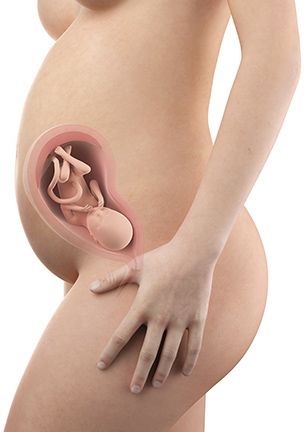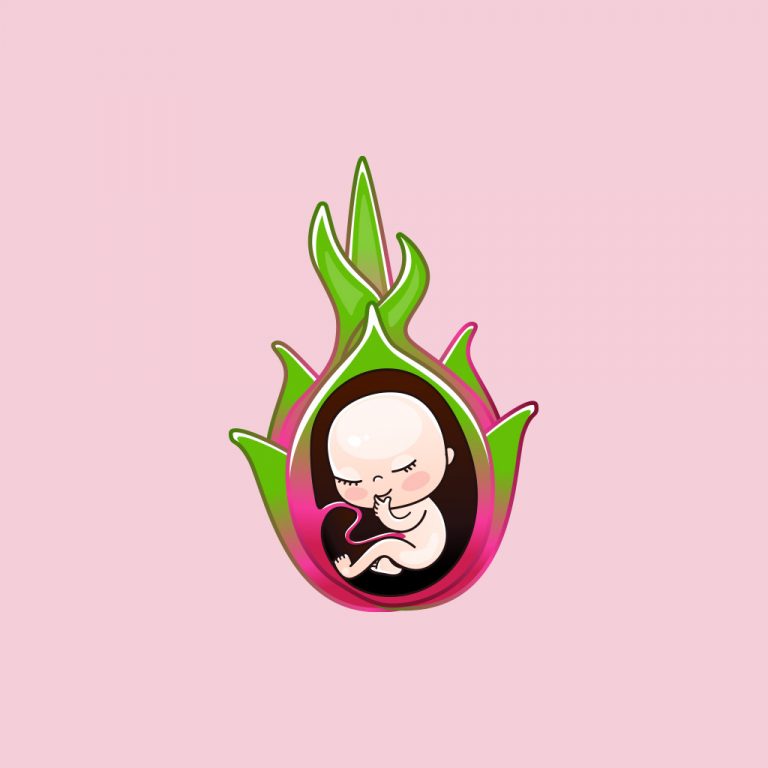Welcome to Week 25! You’re now well into your second trimester, and with just about 15 weeks to go, your baby is growing quickly — and so are the changes you may notice in yourself. This stretch of pregnancy often brings new surprises and some memorable moments, as your baby’s senses wake up and your body gets ready for the busy months ahead.
By now, your baby is about the size of a cauliflower, measuring nearly 13.5 inches (34 centimeters) and weighing around 1.5 pounds (about 680 grams). Inside your belly, your little one is busy practicing tiny reflexes, like kicking and grabbing. You might feel more distinct wiggles, jabs, or even little hiccups as your baby gets stronger. Their hands can now grasp, and they may even respond to your voice or sounds around you, making this an amazing time to talk, sing, or play gentle music.

Your body is adjusting, too. You might notice your belly feels heavier and your center of gravity shifting a bit. Some moms begin to experience new symptoms, like mild swelling in the ankles or feet by the end of the day, thanks to extra fluids and your growing uterus. It can be helpful to rest with your feet up when possible, and wear comfy shoes to support your feet.
Many women start to notice changes in their skin, such as itching or a dark line (the “linea nigra”) appearing down the middle of their belly. This is all a normal part of pregnancy. Moisturizing daily can help with itching, and pick gentle lotions that are fragrance free to keep your skin happy.
Sleep might be a little trickier now, especially as you adjust to sleeping on your side to help blood flow to your baby. Support yourself with pillows between your knees or under your belly—small touches can make a big difference in comfort.
This week is a good time to check in on your prenatal vitamins, drink plenty of water, and continue gentle exercise if you’re able. Always reach out to your healthcare provider with questions or new symptoms. Remember, every pregnancy is unique, and you’re doing an incredible job helping your baby grow.
Your Baby’s Development This Week
At 25 weeks, your baby is busy growing, learning, and getting ready for the world outside your belly! This week brings some amazing milestones that you might not even realize are happening. Here’s a closer look at what your little one is up to during week 25 of pregnancy.
First, let’s talk about size: your baby is now roughly as big as a cauliflower or eggplant, measuring about 13 inches from head to heel and weighing between 1.5 and 1.75 pounds. Inside your womb, your baby is stretching, wiggling, and developing new abilities every day—some you may even notice as stronger kicks and gentle twists!
- Tiny Hands, Stronger Grasp: Your baby’s hands have grown so much—they’re now fully formed and can curl around things. If you could peek inside, you might catch them grabbing the umbilical cord or even practicing a gentle fist. These little practice movements help develop coordination and muscle strength.
- Awakening Senses: This week is especially important for your baby’s senses. Hearing is more advanced now, which means your baby can pick up on muffled sounds from the outside world. Your voice, heartbeat, and even familiar songs or soothing music can all be heard and might lead to little flutters or kicks in response.
- Developing Sleep Cycles: Babies start forming more regular sleep and wake patterns at this stage. You may notice bursts of movement during certain times of the day or night. Interestingly, your baby is also experiencing different stages of sleep, including REM sleep, which is linked to dreaming!
- Fat and Skin Changes: Each day, your baby’s skin becomes less see-through and starts to look pink or red as delicate blood vessels form beneath. More fat is being added under the skin, helping your baby look less wrinkly and preparing to stay warm at birth.
- Building Stronger Organs and Bones: The lungs continue to develop tiny air sacs, while the brain forms more complex layers. Bones are hardening, and joints are more flexible, getting ready for all those baby stretches and yawns after birth.
- Getting a Sense of Direction: Your baby now has a better sense of which way is up or down inside your belly. This development helps prepare them for moving and turning—and eventually, for getting into a head-down position for birth.
One of the most amazing parts of this stage is how interactive your baby is becoming. If you rest and place your hands on your belly, don’t be surprised if those tiny movements become stronger or follow a certain rhythm. Many parents find week 25 the perfect time to talk, sing, or even gently rub their belly—your baby just might “respond” with a playful kick!
As baby gets busier, you’ll likely notice those movements more often, especially when you’re relaxing. Each wiggle and stretch is a wonderful sign that your little one is growing just as they should. Enjoy these precious first connections—your baby is already getting to know you!
Changes in the Mother’s Body
Reaching 25 weeks pregnant is an exciting milestone. By now, you might really be feeling — and seeing — the changes your body is going through as your baby grows. Every week, your body adapts in new ways to support your baby’s development, and it’s completely normal to notice some new sensations or symptoms. Here are some of the most common changes you might experience around this stage, along with a few tips to help you feel your best:
- Your Growing Bump: Your belly is getting bigger and more noticeable! Your uterus is now about the size of a soccer ball, and you may see your belly rounding out above your belly button. Some moms notice their belly expanding sideways a bit, making waistbands feel a lot tighter. It’s a great time to invest in comfy maternity clothes if you haven’t already.
- Bodily Aches and Pains: As your center of gravity changes to accommodate your growing baby, you might feel more aches in your back, hips, or even down your legs. This can sometimes be due to increased pressure on nerves, especially the sciatic nerve, which may cause a deep ache or sharp sensation running through your lower back or the back of your thigh. Gentle stretching, warm baths, or a pillow between your knees at night can make a big difference.
- Breast Changes: Your breasts are in “preparation mode.” You might see a noticeable size increase, and the veins on your chest may start to look more prominent as blood flow rises. Some women notice their nipples getting darker, and you might spot small, light-colored bumps on your areolas — these are Montgomery glands and they help keep your skin hydrated for future breastfeeding.
- Digestive Adjustments: With extra pressure on your abdomen, heartburn, indigestion, and a feeling of fullness can become more common. Eating smaller, more frequent meals and avoiding spicy or greasy foods often helps. You may also find you’re more prone to constipation, so be sure to drink plenty of water and include fiber-rich foods like whole grains, berries, and leafy greens in your meals.
- Braxton Hicks and Movement Awareness: Those gentle, practice contractions — called Braxton Hicks — might show up now when you’re active, dehydrated, or after changing positions. They’re usually painless and irregular. In addition, most moms feel their babies moving, kicking, or even hiccuping more regularly. Try lying on your side after a snack and pay attention to your baby’s unique rhythm!
- Changes in Skin and Hair: You might notice your skin feels stretchier or drier than usual, and your “pregnancy glow” could become more visible. Some women develop a dark vertical line on their belly (linea nigra) or see changes in moles or freckles. Hair might seem thicker or shinier, thanks to pregnancy hormones.
- Energy Levels and Sleep: While many women feel more energetic in the second trimester, it’s also common to start getting tired more easily as your belly grows. Sleep can be interrupted by bathroom trips, leg cramps, or simply finding a comfortable position. Creating a calming bedtime routine and using extra pillows for support can help you get much-needed rest.
Above all, remember that every pregnancy is different. Never hesitate to reach out to your healthcare provider if you’re unsure about a new symptom or need advice. Listening to your body, taking regular breaks, and asking for help when you need it are all important parts of caring for yourself and your growing baby at this stage.
What to Expect at Your 25-Week Prenatal Visit: Checkups & Screenings
At 25 weeks pregnant, it’s important to keep up with your regular prenatal checkups to make sure both you and your baby are staying healthy. Your doctor or midwife will be looking out for a few key things during this stage, even if you feel great. Here’s what you can expect at your appointment and a few screenings that may be discussed around this time.
- Checking Your Baby’s Growth: Your provider will measure your belly from your pubic bone to the top of your uterus. This is called your “fundal height,” and it helps track if your baby is growing as expected. Every woman’s bump is a little different, so don’t worry if your numbers are off by a centimeter or two.
- Listening to Your Baby’s Heartbeat: Hearing that steady, quick heartbeat (usually around 140 beats per minute) can be incredibly reassuring. Your partner may even be able to listen in with a stethoscope at this stage!
- Checking Your Blood Pressure and Urine: High blood pressure or protein in your urine can be early signs of pregnancy complications, such as preeclampsia. By checking regularly, your healthcare team can spot and treat problems early, often before you’d notice any symptoms.
- Screening for Gestational Diabetes: Between 24 and 28 weeks of pregnancy, most women will take a glucose screening. You’ll be asked to drink a sweet drink at the appointment, and then your blood will be tested to see how your body processes sugar. Catching gestational diabetes early helps you get the right care for you and your little one.
- Monitoring for Anemia: Prenatal bloodwork around this time will often check your iron levels. Low iron can make you feel extra tired and short of breath, but it’s usually easy to treat with diet changes or iron supplements if caught early.
- Discussing Any New Symptoms: It’s common to bring up aches, pains, or new symptoms like leg cramps, swelling, or surprise contractions. No question is too small—your care team has heard it all and can help you find comfort or reassurance.
- Keeping Track Of Baby’s Movements: You may be asked about your baby’s regular kicks and movements. Noticing a pattern in your baby’s wiggles and stretches can be a useful way to check in on their well-being.
During your appointment, you’ll also have the chance to talk about any worries, health plans for the coming weeks, or what to expect as your due date moves closer. If you haven’t already, now can be a good time to ask about prenatal classes, hospital tours, and what to bring for your hospital stay.
Remember, these visits are about you and your growing family. Don’t hesitate to ask about anything on your mind—your medical team is there to help you feel informed and supported at every step of your pregnancy journey.
Nutritional Tips and Physical Exercise
At 25 weeks pregnant, nourishing your body and staying gently active can make a big difference for both you and your baby. You’re providing the nutrients your baby needs to keep growing, and physical activity can help manage discomfort and boost your mood.
Here are some straightforward tips to keep you feeling your best during this exciting time:
- Eat a Rainbow of Foods: Aim for a mix of colorful fruits and veggies every day. Carrots, bell peppers, spinach, and berries each offer unique vitamins and minerals to support your baby’s development and your own energy needs.
- Stay Hydrated: Carry a water bottle and sip from it throughout the day. Water helps carry nutrients to your baby, keeps digestion moving smoothly, and may help reduce swelling.
- Power Up with Protein: Include a source of protein in each meal or snack—think Greek yogurt, a handful of nuts, eggs, beans, or lean meats. Protein is especially important now, as your baby’s organs and muscles are developing quickly.
- Don’t Skip Healthy Fats: Healthy fats like those found in avocados, olive oil, and salmon (well-cooked) help your baby’s brain and eyes develop. These also help you feel satisfied after meals and snacks.
- Calcium and Vitamin D Count: Make sure to get enough calcium for your baby’s bones—good sources include milk, yogurt, and fortified plant milks. If you don’t spend much time in the sun, check with your doctor about a vitamin D supplement, too.
- Gentle Movement Every Day: If you feel up to it, aim for 20–30 minutes of light to moderate activity most days. Walking, swimming, or prenatal yoga are all safe choices that can help reduce aches, improve sleep, and lift your spirits. Always check with your healthcare provider before starting something new.
- Stretch With Care: Simple stretches for your back, hips, and legs can ease tension as your body changes. Try gentle side stretches or sit with your legs out and reach forward—but never push to the point of discomfort.
- Listen to Your Body: If you feel tired, dizzy, or out of breath, pause and rest. Some days you may find you can do more, other days less—and that’s perfectly normal.
- Include Iron-Rich Foods: During pregnancy, your need for iron grows. Try to eat lean red meat, poultry, beans, lentils, or fortified cereals. Enjoy a glass of orange juice with these foods—vitamin C helps your body absorb iron better.
- Snack Smart: If you’re hungry between meals, reach for nutritious snacks like cheese and whole-grain crackers, slices of apple with peanut butter, or veggie sticks with hummus. These will keep your energy steady without loading up on empty calories.
Pregnancy is a journey, and every small step you take—whether it’s a stroll around the block or choosing a wholesome snack—helps lay the foundation for your baby’s health and your well-being. Remember, your body is doing something amazing, so be gentle with yourself, take breaks when you need to, and don’t hesitate to ask questions at your next prenatal visit. You’ve got this!
Weekly Checklist
Week 25 brings new milestones and changes for both you and your baby. Here are some gentle reminders to help you care for yourself and keep your pregnancy on a healthy track this week.
- Track Your Baby’s Movements: Notice when your baby is most active. If you’d like, start jotting down their movement patterns to get to know their little routine.
- Take Breaks and Put Your Feet Up: Whenever possible, elevate your legs to reduce swelling and boost circulation—especially if you’re on your feet a lot during the day.
- Try Side-Sleeping: Practice sleeping on your left side to maximize blood flow for you and your baby and to support your growing belly.
- Plan a Fun Prenatal Photoshoot: If you’d like to capture your bump at this beautiful stage, consider scheduling or DIY-ing some photos to remember this special time.
- Prep Healthy Snacks: Stock up on fiber-rich foods like berries, apples, whole-grain crackers, and nuts to support digestion and prevent constipation.
- Start a Birth Preferences List: Jot down your thoughts and wishes for labor and delivery. This doesn’t have to be a detailed plan—just a helpful way to organize what feels important to you.
- Check-In on Emotional Well-Being: Pregnancy brings many feelings. Take a quiet moment to reflect and, if needed, share your emotions with a supportive friend or partner.
- Organize Prenatal Appointments: Confirm your next checkup and keep a list of questions or symptoms to share with your provider.
- Practice Gentle Stretches: Try some slow stretches (like cat-cow or side stretches) with your provider’s okay, to ease tension in your back and hips.
- Hydrate, Hydrate, Hydrate: Keep a water bottle handy and sip throughout the day to stay well hydrated, which helps with energy, digestion, and swelling.
- Review Maternity Leave Details: If you work, look into your maternity benefits and talk with your employer so you’re prepared when the time comes.
- Share Special Moments: Take time to talk, sing, or read to your baby. These quiet moments nurture your growing bond, and your little one may even respond with a gentle wiggle!
Remember, each week brings you closer to meeting your baby. Caring for yourself is the best way to nurture them, too. If anything feels unusual or concerning, reach out to your healthcare team—they’re always there to support you.
When to Call Your Provider
At 25 weeks pregnant, it’s normal to have lots of new sensations and changes, but there are certain signs that you should never ignore. Knowing when to reach out to your healthcare team can give you peace of mind and help keep you and your baby safe. If you notice any of the following symptoms, call your doctor or midwife as soon as possible:
- Sudden or severe swelling in your hands, face, or around your eyes, especially if it comes on quickly or is paired with headaches or changes in your vision.
- Heavy vaginal bleeding or passing large clots—this is different from light spotting, which can be common, but heavier bleeding should never be ignored.
- Severe or constant abdominal pain or pelvic pressure that doesn’t go away when you rest, especially if it feels different from the gentle stretching or occasional tightness you may have felt before.
- Leaking fluid from your vagina, which may feel like a sudden wetness or constant trickle. This could mean your water has broken earlier than expected.
- Fewer baby movements than usual. If your baby suddenly seems much less active than before, try sitting quietly and focusing on their movements. If you don’t feel several kicks or rolls over a couple of hours, call your provider.
- Fever above 100.4°F (38°C) that doesn’t go down or is accompanied by chills and body aches.
- Burning or pain when urinating or seeing blood in your urine, which might be a sign of a urinary tract or kidney infection.
- Intense headaches that don’t improve with rest or over-the-counter medicine (approved by your provider), especially if coupled with blurry vision or spots in your eyesight.
- Difficulty breathing, chest pain, or shortness of breath that isn’t relieved with rest.
- Persistent vomiting or unable to keep any liquids down for more than a day, as this can quickly lead to dehydration.
Always remember, it’s better to call and find out that everything is okay than to wait and risk missing something important. Your care team is there to support you and answer any concerns—no matter how small they may seem.
Preparations for Baby
As your baby continues to grow, taking some time each week to get both your heart and home ready can really help you feel more confident. Planning ahead now, even in small steps, makes a big difference when your little one arrives.
Here are some practical tips to guide you during Week 25:
- Start Gathering the Basics: Think about a few essentials your baby will need, like a safe crib or bassinet, a car seat, and soft baby blankets. Making a simple checklist can help you keep track of what you have and what you’ll still need to pick up.
- Create a Calm Corner: Try setting up a small area at home where you can relax and bond with your baby—maybe a cozy chair with a soft lamp and a spot for diapers and wipes. Even a small nook can become a special space for feeding and cuddles.
- Wash Baby Clothes and Linens: If you’ve started collecting baby clothes or bedding, washing them with gentle, fragrance-free detergent is a great, easy prep step. This helps protect your baby’s sensitive skin and gives you a sense of accomplishment.
- Talk and Connect with Your Baby: Spend a few minutes each day quietly talking, reading, or singing to your baby bump. Your baby can now hear your voice, and these little moments can create a beautiful connection even before birth.
- Preview Your Support System: Think about who can help you in the early weeks—family, friends, or neighbors. If you feel comfortable, share ways they might be able to support you, such as bringing meals, running errands, or helping with housework.
- Keep a Journal: Capturing your thoughts, hopes, or questions each week can not only be soothing, but it’s also a lovely keepsake to look back on. Write down one thing you’re excited about or a funny moment from your pregnancy journey.
- Check Out Childbirth or Baby Care Classes: Many hospitals and community centers offer short courses on birthing or caring for a newborn—sometimes virtually. Signing up for one now can help you feel more empowered and less nervous.
Remember, you don’t need to do everything at once—just making gentle progress each week is enough. Celebrate each small step and know that you’re building a caring and welcoming world for your baby, one day at a time.
Citations and References
- American College of Obstetricians and Gynecologists (ACOG) – Offers comprehensive guidance on fetal development, nutrition, weight gain, and prenatal care recommendations for the second trimester. Visit Source
- Centers for Disease Control and Prevention (CDC) – Provides detailed information on prenatal nutrition (including folic acid), fetal milestones, and healthy pregnancy tips. Visit Source
- Mayo Clinic – Features a week-by-week pregnancy guide covering baby’s size, common symptoms, body changes, and signs when to call your provider at 25 weeks. Visit Source
- Cleveland Clinic – Explains common symptoms at week 25 such as back pain, Braxton Hicks contractions, fetal movement patterns, and advice for managing discomfort. Visit Source
- National Institutes of Health (NIH) – Summarizes recommended prenatal care, weight gain guidelines, and essential nutrients (such as folate) for pregnancy. Visit Source
- World Health Organization (WHO) – Provides international standards for maternal nutrition, safe pregnancy, and antenatal care recommendations. Visit Source










